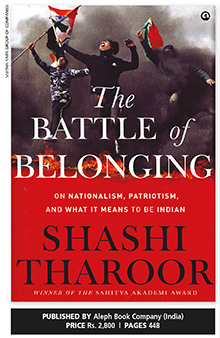BOOKRACK
By Vijitha Yapa
As I began reading Shashi Tharoor’s new book titled ‘The Battle of Belonging: On Nationalism, Patriotism and What It Means To Be Indian’ – where he argues about the future of India – a little story came to mind…
Biden, Putin and Xi had been arguing about who’s in charge of the world. Was it the US, Russia or China?
 They couldn’t agree so they decided to ask Modi…
They couldn’t agree so they decided to ask Modi…
Modi replied: “All I know is that the CEOs of Google, Microsoft, Adobe, NetApp, Mastercard, DBS Bank, Novartis, SanDisk, Micron, Palo Alto Networks, Reckitt Benckiser and IBM are all Indians. Similarly, the Chancellor of Britain, British Home Secretary and US Vice President are also Indians.”
I could go on… but who indeed is running the world?
It’s what’s happening in India right now that matters – rather than the number of CEOs of Indian origin.
Though Tharoor was born in the UK, he prefers to have an Indian passport rather than a British one because he’s proud of his heritage and wants to be a part of that nation. So it hurts him to see where Prime Minister Narendra Modi’s policies are taking his beloved land.
India’s pride was its secularity. The 1.3 billion people who inhabit this vast subcontinent speak over 500 different languages, follow diverse religions and enjoy a variety of cultures. In the past, these people worked together though they had different views. But today, the scenario in India is very different.
Tharoor points out that concepts such as nationalism, patriotism, liberalism, democracy and humanism emerged mainly from the West, in the 18th and 19th centuries.
He also talks about the enlightening values of Indian leaders such as Mahatma Gandhi and Jawaharlal Nehru, who contributed to creating the Indian state, and contrasts this with the “narrow-minded, divisive, sectarian us vs them alternatives formulated by the Hindutva ideologues.”
And he laments that the struggle for India’s soul has been heightened and broadened, and “threatens to hollow out and destroy the remarkable concepts of pluralism, secularism and inclusive nationhood that were bestowed upon the nation at Independence.”
Tharoor believes that every passing month sees new attacks on the ideals for which India has long been admired, as authoritarian leaders and their bigoted supporters push the country towards a state of illiberalism and intolerance.
Rajmohan Gandhi, grandson of the Mahatma, says Hindutva or Hindu nationalism is on the rise in India. He avers: “Donald Trump in the US, Narendra Modi in India, Recep Tayyip Erdoğan in Turkey and Jair Bolsonaro in Brazil are among the well-known symbols of ethno-nationalism’s growth.”
He continues: “In each affected country, that growth has been accompanied by a decline in the autonomy and energy of democracy’s institutions … legislatures, courts of justice, the media, universities, police forces, investigative and prosecuting agencies, even the military, all seem to suffer. Ethno-nationalism may therefore also be defined as an imperialist spirit within a nation state.”
Meanwhile, a court in Gujarat’s Kutch recently issued a non-bailable warrant against senior journalist Paranjoy Guha Thakurta. He was reportedly charged with defamation under Section 500 of the Indian Penal Code.
Indian journalist Kalpana Sharma points out that Thakurta had been slapped with a defamation suit by the Adani Group for an article he wrote in the Economic and Political Weekly in 2017, alleging that the conglomerate had benefitted to the tune of Indian Rupees 500 crore because the Modi government had amended special economic zone rules.
The Adani Group is not unknown in Sri Lanka because of the controversy regarding the East and West Container Terminals of the Port of Colombo.
Some points that Tharoor makes offer an interesting perspective. For example, East Bengalis sought independence from Pakistan because the latter imposed Urdu as the national language. Bangladesh was the result of that episode.
Sri Lanka will soon be in the spotlight in Geneva at the United Nations Commission on Human Rights. Extremists in the Tamil diaspora are working with some Western governments to have Sri Lanka punished.
An interesting point the author makes is about diaspora nationalism where people who live in foreign countries advocate and finance (and often arm) nationalist movements in their motherlands – often out of a nostalgic longing for an idealised homeland that they’ve been forced to abandon.
This book, which has been meticulously researched, is a plea from one who is proud of what India has achieved. It calls for it to remain a secular, independent and democratic nation.
Though Tharoor was born in the UK, he prefers to have an Indian passport rather than a British one because he’s proud of his heritage




